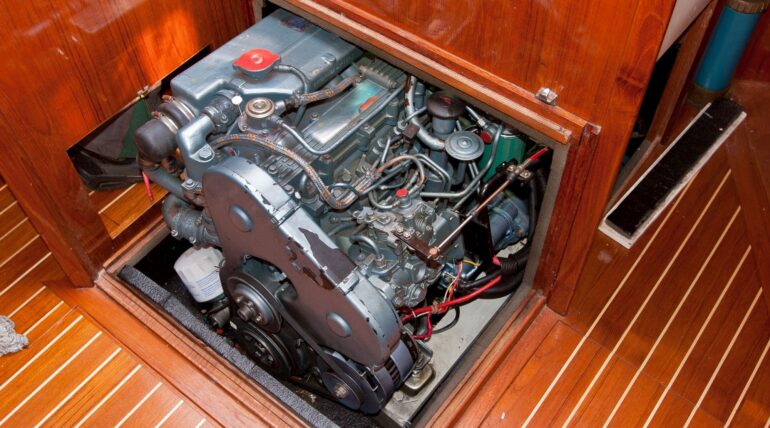
May 15, 2025
Your Guide to Boat Engine Troubleshooting in Kemah
Category: Boat Maintenance, Marine Engine Services, Troubleshooting
Tags: Boat Engine Troubleshooting, Marine Engine Problems, Engine Won’t Start, Overheating Boat Engine, Poor Engine Performance, Marine Mechanic Kemah, DIY Boat Repair, Engine Diagnostics, Boat Maintenance Tips, Local Marine Service
That sinking feeling when your boat engine refuses to cooperate can quickly dampen your spirits on the waters of Kemah, TX. Whether you’re preparing for a cruise on Clear Lake or planning a fishing trip in Galveston Bay, a sputtering or silent engine is the last thing you need. Understanding the basics of boat engine troubleshooting can empower you to identify minor issues, communicate effectively with your marine mechanic, and potentially even get back on the water faster.
Safety First: Before You Begin Troubleshooting
Before you even think about tinkering with your engine, prioritize safety:
- Turn off the engine completely. Ensure the ignition is off and the key is removed.
- Allow the engine to cool down if it has been running, especially if overheating is suspected.
- Ensure proper ventilation if you’re working in an enclosed engine compartment.
- Disconnect the battery if you’re working on electrical components to prevent accidental shorts.
- Consult your owner’s manual. It contains valuable information specific to your engine model.
- If you’re uncomfortable or unsure, don’t hesitate to call a professional marine mechanic like Yes Centers in Kemah.
Common Boat Engine Problems and Basic Troubleshooting Steps:
Here’s a breakdown of common engine issues and some initial troubleshooting steps you can take:
1. Engine Won’t Start:
- Check the Battery:
- Connection: Ensure battery cables are clean, tight, and free of corrosion.
- Charge: Verify the battery has sufficient charge. Try starting with a known good battery or jump-starting (following proper procedures).
- Battery Switch: Make sure the battery switch is in the correct “on” position.
- Inspect Fuel Supply:
- Fuel Level: Ensure you have enough fuel in the tank.
- Fuel Valve: Check if the fuel shut-off valve is open.
- Fuel Lines: Look for any kinks, leaks, or obstructions in the fuel lines.
- Primer Bulb (Outboards): Squeeze the primer bulb until it feels firm, indicating fuel is reaching the engine.
- Check the Kill Switch/Lanyard: Ensure the kill switch lanyard is properly attached.
- Inspect Wiring: Look for any loose or disconnected wires, especially around the starter and ignition system.
- Check Fuses and Circuit Breakers: Inspect for any blown fuses or tripped circuit breakers in the engine’s electrical system.
2. Engine Starts But Stalls Quickly:
- Fuel Issues: Similar to “won’t start,” check for fuel contamination, clogged filters, or low fuel pressure.
- Air Intake Obstruction: Ensure the air intake is not blocked by debris.
- Idle Adjustment: The idle speed might be set too low. (Consult your manual for adjustment procedures or seek professional help).
3. Engine Overheats:
- Check Coolant Level (Inboards): Ensure the coolant level in the expansion tank is within the recommended range.
- Inspect Raw Water Intake: Make sure the raw water intake is not blocked by weeds, debris, or marine growth.
- Check Raw Water Strainer: Clean the raw water strainer to ensure proper water flow to the cooling system.
- Inspect Impeller: A worn or damaged water pump impeller is a common cause of overheating. (This often requires professional inspection and replacement).
- Check for Leaks: Look for any visible coolant leaks in hoses or around the engine.
4. Poor Engine Performance or Power Loss:
- Fuel Issues: Again, consider fuel quality, filters, and potential blockages.
- Propeller Damage: Inspect your propeller for any bends, nicks, or missing pieces. Even minor damage can significantly impact performance.
- Dirty Air Filter (If Applicable): A clogged air filter can restrict airflow.
- Spark Plugs (Gas Engines): Fouled or worn spark plugs can cause misfires and power loss. (Consult your manual for inspection and replacement).
- Throttle Cable Issues: Ensure the throttle cable is moving freely and fully opening the throttle.
When to Call a Professional Marine Mechanic in Kemah:
While some basic troubleshooting can be done yourself, certain situations require the expertise of a qualified marine mechanic like Yes Centers:
- You’re uncomfortable or unsure about any step.
- The problem persists after your initial checks.
- The issue involves complex systems like fuel injection, electronic controls, or internal engine components.
- You suspect a major mechanical problem.
- Overheating continues after checking basic cooling system components.
Yes Centers: Your Trusted Partner for Boat Engine Troubleshooting and Repair in Kemah, TX
At Yes Centers, located in Kemah, TX, our experienced technicians have the knowledge and tools to accurately diagnose and repair a wide range of boat engine problems. We understand the unique challenges of the marine environment and are dedicated to getting you back on the water safely and efficiently.
Don’t let engine trouble ruin your boating experience. If you’re facing engine issues in the Kemah area, contact the experts at Yes Centers.
Request Service by filling out our service request form: https://yescenters.com/service-request-form/
Let us help you decode the dilemma and get your boat running smoothly again!
